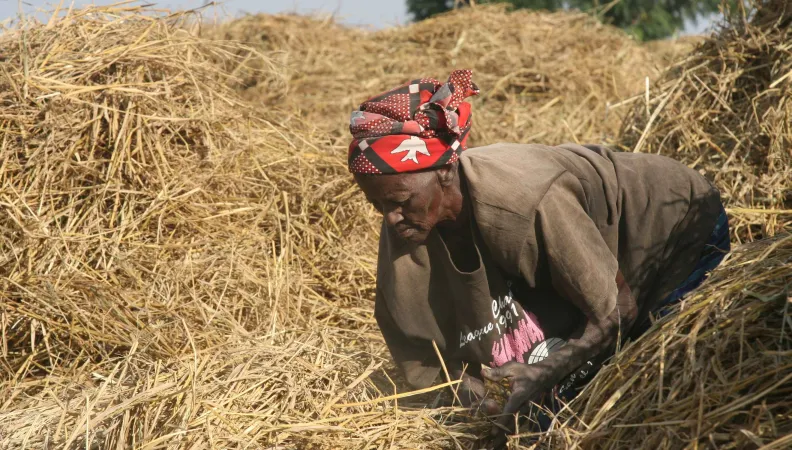Share the page
Food Insecurity: Supporting Family Farms through Public Policy
Published on

In the face of a worsening global food crisis, particularly in Sub-Saharan Africa, AFD is part of the effort to fulfill Sustainable Development Goal number 2: achieving “zero hunger.” Much of African agriculture is small-scale, often run by families. Public policy has an essential role to play in scaling up family farming, and intensifying agro-ecological production, to provide communities with better nutrition.
While the repercussions of the Covid-19 pandemic and the impact of the Ukraine war continue to undermine food security in many regions of the world, the fight against hunger is set to be a key issue on the international political agenda in 2023.
The continued disruption of global food supply chains has highlighted Africa’s dependence on agricultural production. “Africa should not have a food problem because we have a wealth of resources: arable land, water resources, diverse flora and fauna, dynamic and active young people, and solar energy,” says Kolyang Palebele, President of the Pan African Farmers Organization (PAFO). “Africa is a very rich continent, but remains the least protected in terms of food, despite the policies and strategies developed.”
See also: UN Food Summit: “We Need to Recognize the Links between Climate Change and Food Security”
Despite the assistance provided to farmers, and the technical progress made over the past twenty years, the gains have not been consolidated, due to a lack of support for joined-up public policy in many countries. “With the continent’s population set to double by 2050, this will be the key political challenge for every African leader over the next thirty years,” says Ibrahim Mayaki, former Niger Prime Minister. “If we cannot feed these communities, we will face a growing number of political and security crises.”
Improving food production has long been a concern in Africa, as highlighted in the 2014 Malabo Declaration on accelerated agricultural growth, which sought to reinforce the collective commitment made more than a decade earlier to invest 10% of their national budgets in agriculture.
“Since the Maputo Declaration in 2003, only seven or eight African countries have met this commitment,” says Ibrahim Mayaki. “And yet, public policy cannot be developed without public investment.”
Matthieu Brun, Scientific Director of the FARM Foundation agrees, arguing that “the more countries depend on agriculture, the less they support it”.
See also: AFD Intervenes to Tackle the Food Crisis
Family farming as a driving force
“Crises tend to reveal structural weaknesses. Public policy acts as a shield against these shocks,” says Christophe Guilhou, Director of Sustainable Development at France’s Ministry of Europe and Foreign Affairs. “We need to support more productive, resilient and sustainable models for Africa.”
Government support for the private sector is also an essential driver, particularly for small-scale family farms, which produce 80% of the food consumed. “Farmers’ organizations have a central role to play,” says Kolyang Palebele. “From the outset, they must be involved in the design, the implementation and evaluation of all these policies, so that they can provide their knowledge, which is essential for food security.
“If the political climate is favorable and stable opportunities are available, the private sector will be able to draw on the entire value chain of agricultural production, including land, yields, distribution and storage.”
This strategic position is reflected in the financial support offered by Proparco, AFD Group’s subsidiary responsible for the private sector. “Agricultural and rural development require the expansion of a complex ecosystem of public and private actors,” says Morgane Rocher, Senior Investment Officer at Proparco.
“We understand the need to bolster the business environment to create the necessary incentives to finance smaller players in agricultural value chains: very small enterprises, agricultural SMEs and producers’ associations, each with very specific needs.”
Public standards and funding can be used to leverage private investment. “The private sector needs a clear and coherent regulatory framework and public policy across the entire value chain,” she says. That ranges from the regulation of local markets to the steering of agro-ecological transition strategies and customization of financial products.
See also: Ukrainian War Worsens African Food Crisis
The aim is to meet the annual financing needs of the 70 million small-scale producers and breeders in Sub-Saharan Africa, estimated at $55 billion. “The agricultural sector is still lacking finance, is still high-risk, and invariably shunned by investors,” says Touraya Triki, Director of the Sustainable Production, Markets and Institutions Division of the International Fund for Agricultural Development (IFAD). “Nothing can be done unless family farmers are able to sufficiently invest in their businesses to adapt to crises and to the market.”
Public policy needs to be forged across many fields, from land tenure and fiscal policy, to training and employment, and the development of infrastructure in rural areas.
Social safety nets to support food security
Public policies need to be targeted. Women and children are still the first victims of the food crisis. “But in 2022, many countries subsidized the price of food without targeting the beneficiaries when it has been found that these subsidies are ineffective in reaching the most vulnerable communities,” says Agnès Soucat, Head of AFD’s Health and Social Protection Division.
Between 2013 and 2021, AFD Group pledged €3.9 billion to combat food insecurity in Sub-Saharan Africa. Marrying investment with focused public policy will make every euro go that much further.
